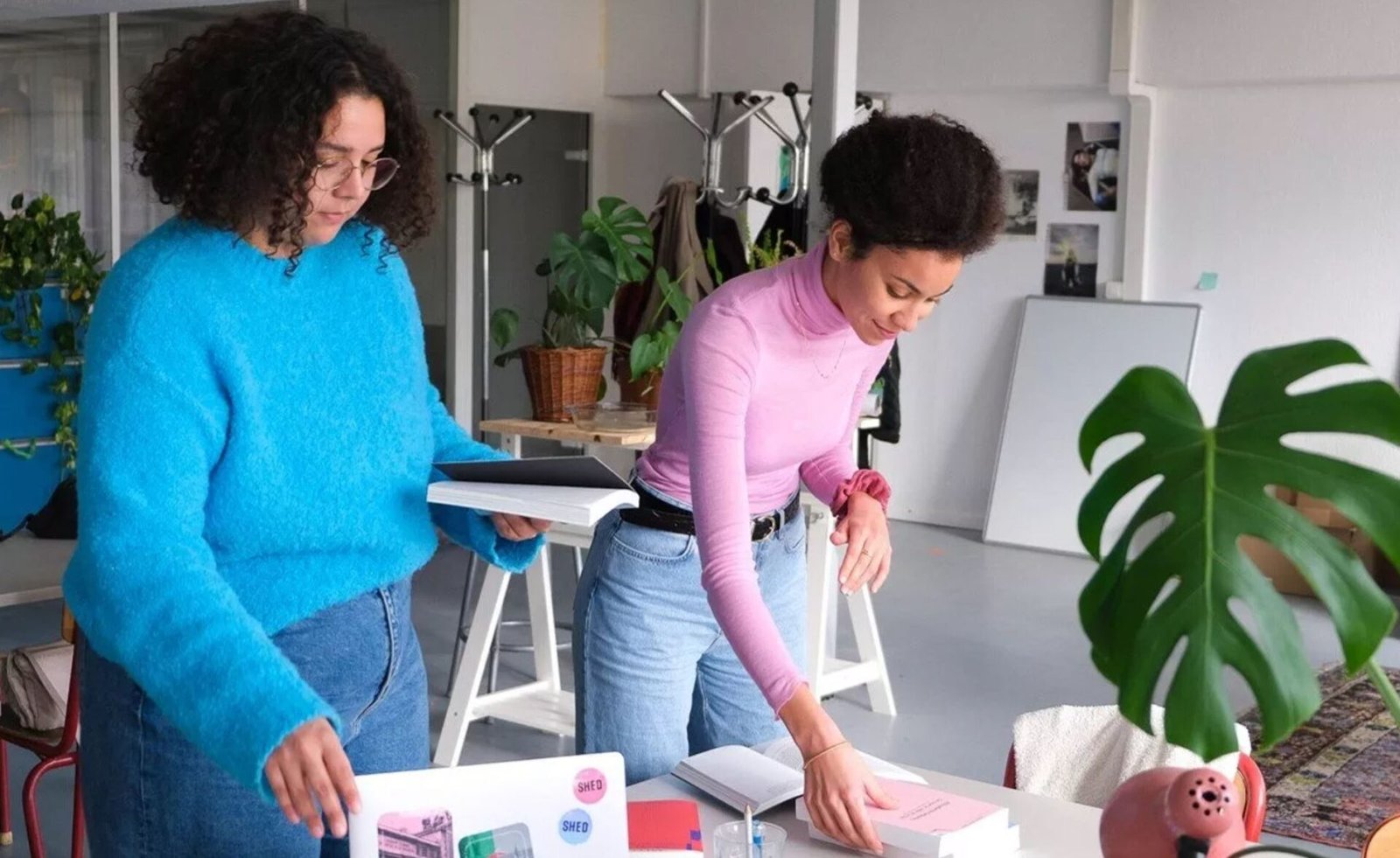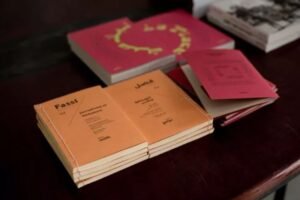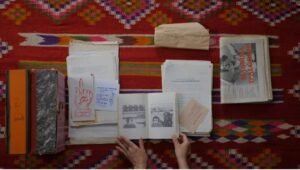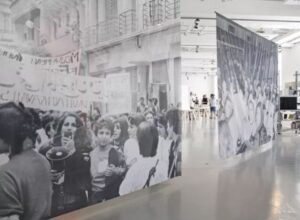In light of the commemoration of the 60th anniversary of Algeria’s independence, and in a shackled society, independent publishing is making its way on both shores of the Mediterranean by launching innovative publications and magazines. With a contemporary look, a new generation is dusting off the archives, working more collaboratively, and emphasizing its militant character.
“If I had succeeded in creating or joining a cultural association, I would not have started a publishing house,” recalls Maya Ouebadi, founder of Motifs, a publishing house launched in Algiers in 2018. At the time, she had left her position as an assistant. Publishing director at Dar Al-Barzakh Independent, a position she held for six years. Maya seeks to resurrect the Chrysalide Society, which was created in the year 2000 and frequented mainly by writers and filmmakers. She joined this team in 2014, but administrative barriers hindered the initiative, and she intends to publish a magazine for literary criticism within the framework of the association. “Through my experience at Dar al-Barzakh, I noticed that books receive little resonance after their publication. Work had to be done to create a meeting between readers and books.”
Maya was motivated by the desire to contribute to the literary boom that Algeria witnessed at the time, and to document it in particular, so she overcame her reservations about the corporate world, and founded the “Fasl” magazine for literary criticism. Each issue is presented as a veritable “object”, collecting in a hand-stitched box in-depth critical articles, interviews and portraits of Algerian and foreign authors, as well as long unpublished excerpts from unpublished novels, all in Arabic and French. “Bilingualism has always been an optional bias for us because a journal of contemporary Algerian literature cannot be complete if it is not in both languages,” says the publisher. The proportion of Arabic-speaking and French-speaking readers is almost equal, although we notice that the Arabic language is sweeping more space. She adds: “I also notice that the English language is already present among the younger generations who use it on a daily basis, even outside the capital. Therefore, translating the “Fassal” magazine into English may be an option in the future. In addition to this magazine, whose fifth special issue, dedicated to writer Asia Jabbar, will be published in January
“Fessal” and “Liballa” magazines.
Photography credits: Saniya Murabet.
“Excavations” of the Algerian feminist movement
In March 2019, the Algerian movement was in full swing. Feminist marches have merged into the movement on the occasion of International Women’s Rights Day. At that time, researcher Awal Hawati created a Facebook page entitled “The Archive of Women’s Struggles in Algeria.” The idea was to collect, digitize, share and distribute documents produced by militant feminist groups and associations through an online platform. “I had found its first traces at home, before the move. Women activists from my family carefully preserved some documents, such as the alphabet of women’s struggles in Algeria from 1990 to 1992.” This is how this project – which she had dreamed of for a long time – saw the light at the moment of movement. “The movement was really motivating,” the researcher recalls. Going out to protest made us go back to what was really there in the eighties and nineties.” She and Saadia Kassem laid the foundations for the project, then contacted the feminists they knew, and the result exceeded their expectations. “We were surprised by the amount and variety of documents we collected. Some of the topics covered were bold for the time, with quality graphic design.”
The two women questioned the permanence of the discourse asserting that there is no archive for contemporary Algeria since 1962: “We wondered where this idea came from and why it is so deeply rooted.” Together with Lydia Saidi, a photographer and archivist, they collected and digitized about 800 documents: general statements, pamphlets, posters, magazines and drawings, in Algiers, Kabylie, Constantine, and also in Oran. The bulk of this archive dates back to the period between 1989 and 1991, that is, during the democratic “loophole” that allowed the mobilization of women.
Archive of women’s struggles.,
Image credit: Archive of Women’s Struggles in Algeria.
“As protesters, we witnessed the return of the slogans of the 80s and 90s in the feminist movement of 2019. Proving that the memory of struggles, bodies, and songs exist, even if there is not always an archive attesting to this.” During the 1990s, the production of feminist groups slowed significantly and then ceased altogether. The “black decade” broke this wave. “The period that preceded this fracture is really worth exploring, but it is still difficult to deal with it with female activists, as it remains a wound for them. They are happy with our interest in these documents, but returning to this painful past is difficult to bear.”
The researchers stored all the documents on a hard disk in order to form a documentary inventory that could be accessed upon request, with the aim of creating a platform for sharing. While waiting for that, the project actually saw the light in the form of two exhibitions, one at the initiative of the Regional Fund for Contemporary Art in Orléans (France), and the other within the framework of “Documenta 15” in Kassel (Germany), which is the largest demonstration of modern and contemporary art in the world. Thus, what was originally supposed to be the exhibition catalog turned into a real book in three languages – Arabic, French and English – entitled “An Archive of Women’s Struggles in Algeria.” A thousand copies have been printed, and it is partly distributed in the “Documenta 15” stores in Kassel. The project team also manages another warehouse in Marseille, the place where the book was printed, and takes care of its own distribution, mainly via Instagram. The remaining copies will be distributed during meetings in Algeria and elsewhere, and via a website dedicated to international sales.
Teamwork is at the heart of the project
For the publisher of “Dawafia”, the difficulties encountered in the field of distribution are always the same, and prompt an adaptation in getting things done. Maya and Abadi explain: “Distribution abroad is difficult, so we carry the numbers in our bags. We can’t travel thousands of times to transport books, but our families and friends volunteer to do so. It is a way to survive and develop in the Algerian context.” Maya realized the necessity of teamwork and on several projects at the same time. “I might be an assistant on a film project for a friend who, in turn, will accompany me on another project. I believe in the need to change places to help each other, create competition, and even survive when morale and motivation fail in our challenging environment.”
This way of dealing with publishing as a collective work can also be found on the other side of the Mediterranean at “Shed Publishing”, an independent publishing house founded in 2020 by Lydia Amaroush, who comes from the Algerian diaspora and is based in Marseille.
Originally, this publishing house was a group reading workshop organized by Lydia Amaroush with Anis Marhoum in March 2020 in Aubervilliers (a northern suburb of Paris). And Anis Marhoum is the co-founder of Ateliers d’Alger. The term group reading dates back to a methodology popularized by popular education movements in the 1950s, consisting of dividing a text considered difficult into passages that are printed on sheets of paper and distributed to those present.
The multi-skilled group, based in Algiers and Paris, specializes in citizen consultation and participatory workshops to create public space. Its mission is to support citizenship initiatives and local initiatives to invest in the public space. The group reading workshop in March 2020 dealt with Samia Hani’s book, “Architecture de la contre-révolution”, which deals with the use of architecture during the war of liberation for military purposes, and also provides maps that explain the strategies that were developed to maintain control over Algeria by the French. This workshop created a desire to find a framework for Samia Hani to continue thinking about colonial architecture and its situation after independence. “I wanted to develop colonial issues as well as queer and LGBTQ issues,” explains Lydia Amaroush. A publishing house seemed to me a good place to explore these issues, as paper is an available medium.”
Favorable circumstances converged for the young publisher, and she launched a publishing house. She was soon joined by two other people, the poet Laura Pollic, and Nesma Marhoum, the co-founder of the Algiers Workshops. The latter explains the reasons that prompted her to embark on this adventure: “I worked in many fields of writing, including journalism. In the book business we try to think in terms of sustainable, individual and environmental ethics. The book has its weight in the cultural industry, both literally and figuratively. We design it in such a way that it becomes a permanent part of the collective memory.”
The house has already published three books since its inception. The most recent of these, Habiter l’indépendance, Alger : conditions d’une architecture de l’occupation, was published in fall 2022. This book, which focuses on Algiers, examines the conditions of An urban experiment, and questions the colonial component of architecture. When Algeria gained its independence in 1962, the population inherited a space shaped by the architecture of the French colonial state over 132 years, and entered, in an unprecedented way in their history, a space built to exclude them.
A photo from the “Documenta 15” exhibition in Kassel (Germany), Image credit: Archive of Women’s Struggles in Algeria.
Remove the promotional character of the archive
Like Saadia Kacem and Awal Hawati from the “Archives of Women’s Struggles in Algeria” group, the group of authors of the book “Inhabiting Independence” works to dust off the Algerian and French archives, which have sometimes been classified, through conversations with Samia Hani, and based on her work regarding the use of Architecture and urbanism in imposing a disciplinary social and political system. In their text, Khadija Rol and Anis Marhoum of the Algiers Workshops tell the story of the reconfiguration of Algiers as a model city, notably through the decoding of colonial cartography.
Access to the archives is not always easy, in France as in Algeria, and when it is available, indexing is sometimes lacking to simplify searches, which Lydia Amaroush regrets: “It is said that this is due to security reasons. I do not have the impression that there is an accountability of the French Empire, as happened with the two world wars.” The group believes that access to the archives, and in particular the “de-publicisation” of it, is essential. Anis Marhoum adds that he has not seen “many texts in architecture that adopt a critical viewpoint by talking about ownership and eviction. We are a generation tired of reading texts written from a historical point of view, without distance and without condemnation.” Both Anis Marhoum and Khadija Rol, from the beginning of their text, denounce the use of the city of Algiers as an architectural laboratory, and a testing ground for European architects between the thirties and fifties of the last century, and sometimes for unreasonable projects.
Beyond the book
In addition to the collection of studies that mainly relate to the colonial period, Shed Publishing publishes a youth collection with the aim of getting out of political thinking, “reform and turning to youth, which symbolizes hope,” according to Lydia Amrouche. The first book, Tout est si brillant, deals with issues of cultural heritage and self-confidence. The young publisher wanted to publish it in three languages, Arabic, French and English, but financial reasons prevented that. “We would like to collaborate with publishing houses abroad and work on joint publications.” The young publisher dreams of distributing her books in Algeria. A dream in which Saadia Qasim, Awal Hawati and Lydia Saadi share. She also dreams of renewing the experience, through a more accomplished publication that includes several contributions and covers a wider period from 1989-1991 on the one hand, and organizing an exhibition for Algerians on the other.
Translated from https://orientxxi.info/magazine/article6096








